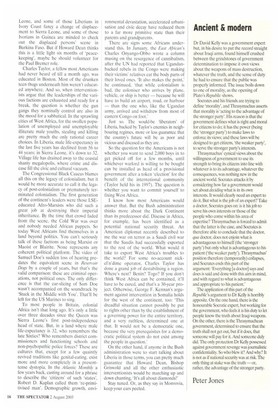Ancient & modern
Dr David Kelly was a government expert but, in his desire to put the record straight about Iraqi arms, found himself crushed between the grindstones of government determination to impose it own views about the weapons of mass destruction, whatever the truth, and the sense of duty he had to ensure that the public was properly informed. The issue boils down to one of morality, as the opening of Plato's Republic shows.
Socrates and his friends are trying to define `morality', and Thrasymachus asserts that morality is 'acting to the advantage of the stronger party'. His reason is that the government defines what is right and moral for citizens to do; it has the power (being the 'stronger party') to make laws to enforce its views; and these laws will be designed to get citizens, the weaker party', to serve the stronger party's interests.
Thrasymachus' cynical views about the willingness of government to use its strength to bring its citizens into line with whatever is to its advantage, whatever the consequences, was nothing new in the ancient world. Socrates attacks it by considering how far a government would set about deciding what is in its own interests. It would clearly need an expert to do it. But what is the job of an expert? Take a doctor, Socrates goes on: is it his job to serve his own interests or those of the people who come within his area of expertise? Thrasymachus is forced to admit that the latter is the case, and Socrates is therefore able to conclude that the doctor, qua doctor, does not enjoin what is advantageous to himself (the 'stronger party') but only what is advantageous to his patient (the weaker party'). Thrasymachus' position therefore (temporarily) collapses, and Socrates ends this part of the argument: 'Everything [a doctor] says and does is said and done with this aim in mind, and with regard to what is advantageous and appropriate to his patient.'
The application of this part of the Republic's argument to Dr Kelly is horribly apposite. On the one hand, there is the honourable Socratic expert, but working for the government, who feels it is his duty to let people know the truth about Iraqi weapons. On the other, there is the Thrasymachean government, determined to ensure that the truth shall not get out, but if it does, that someone will pay for it. And someone duly did. The only protection Dr Kelly possessed against government revenge was journalistic confidentiality. So who blew it? And why? It is not as if national security was at risk. The only thing at stake was the truth —or, rather, the advantage of the stronger party.
Peter Jones


























































 Previous page
Previous page